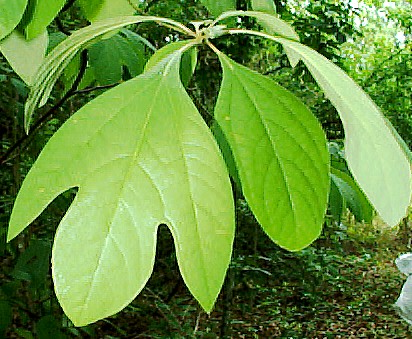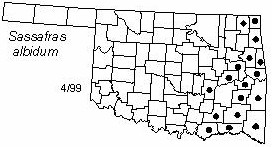
Tree to 12 m (40 ft) tall and 25 cm (10 in) in diameter with a narrow crown. Bark thick, gray to brown, deeply furrowed. Twigs thin, usually greenish, smooth, glabrous. Buds rounded, greenish, covered with four scales. Leaves variable, entire or with 2 or 3 lobes, elliptical in outline, 7.5-13 cm (3-5 in) long and 4-10 cm (1.6-4 in) wide, shiny green above and paler below. Flowers small, yellowish green, clustered at end of leafless twigs in early spring. Fruits elliptical blue-black berries about 1 cm (0.4 in) long in a red cup on a long red stalk, ripening in Fall.
Distribution: Native to about the eastern half of the U. S.
Habitat: Scattered in upland and bottomland forests, often forming thickets in abandoned fields and other disturbed areas.
NWI status: FACU
Comment: The bark of the roots is used to make a pleasant tasting "tea". The powdered leaves are used in Louisiana to thicken soup. Sassafras is derived from an old French word referring to its use in medicine; albidum refers to the light-colored wood.
Distribution in Oklahoma: 
BACK
NEXT
RETURN TO INDEX
Last update: 9/20/99
 Go to Oklahoma Biological Survey Home Page
Go to Oklahoma Biological Survey Home Page
 Disclaimer
Disclaimer